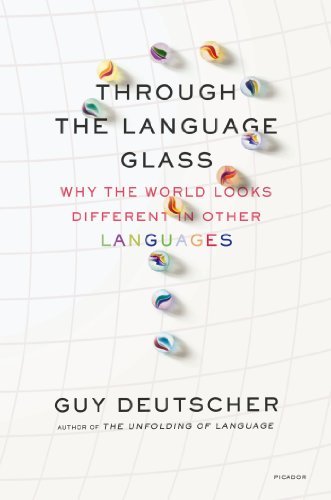 Through the Language Glass, Guy Deutscher
Through the Language Glass, Guy Deutscher
I can understand people who feel that Through the Language Glass didn’t quite fulfill its promise. The subtitle might be more accurately, “does the world look different in other languages?” And the answer is yes, but in a limited way that won’t be satisfying to those who want the answer to be an unequivocal yes. People feel that the world is different (for them) in different languages, and even that they are different in other languages, but there just isn’t the scientific data to back those feelings up.
(For me, and this is a brief digression, I do suspect that those who “feel different” when they speak other languages aren’t taking into account context. For example, say you speak Hebrew with your family and English in school. You are a different person in those two contexts, but not because of the language you speak. You’re adapting yourself to the situation, including the language. I suspect that even years after that division is so clear, where you might speak Hebrew to someone in the workplace, the associations remain.)
Anyway, I found the book itself a bit dense and prone to repetition, but overall, very interesting. I loved the discussion of the issue of colour in Homer’s work, as it’s something that inevitably came up when discussing his epithets in class. Why “wine-dark sea”? How could the sea look like wine? And this book has the answer.
It’s fairly conservative in its conclusions, not going beyond the available data — and mocking rather people who did go beyond their data — and explaining everything at some length rather than packing in various new ideas. It does include a lot of examples and interesting facts about various languages, like languages which don’t use egocentric directions but always geographical ones. I would’ve been interested in a bit more on gendered language, but it doesn’t seem as if the work has been done there, yet. It also gives some credit for ideas that were ahead of their time, even if they were founded on shaky principles, which was interesting.
Ultimately, Deutscher explains why early assumptions that language affects the way we perceive the world were wrong — but then goes on to explain that that instinctive feeling isn’t wrong in itself.

I didn’t read this book, but I’m bilingual and I can say from experience: yes, you do feel different speaking different languages. The difference is subtle though. You see, different languages have different metaphors, different cultural connotations. Some parallel words (always translated one into another) have slightly different meanings, so while speaking you adjust you perspective. It’s not simply translating word for word, it’s conveying the same meaning that’s important. That’s why literary translation is considered an art. It takes talent to switch your world view from one language to another and bring your vision to the readers in another tongue. I tried – and it was a fascinating project of mine, although I can’t judge how successful; that’s for readers to decide. I loved working on translations but I have to admit: the hardest to translate was poetry – emotion in verbal form – which brings us back to the topic of this book. How to make the readers see the same emotional wave in a different tongue, while staying true to the original’s words, is the hardest challenge of any translator.
There is that too, but I think the difference really is subtle. I think feeling different might really be mostly a feeling, not an actual change anywhere in your brain’s architecture, except as a result of contextual issues. I mean, there’s a word in Welsh, “hiraeth”, that is close to untranslatable (into English, at least). There are ways you can convey the meaning, but they tend to be long-winded. I’m not a Welsh speaker, but I have always felt the emotion of hiraeth and understood immediately when given the word for it. So it’s not the language itself that makes that difference between me and an English person, who doesn’t find it easy to grasp the concept (not impossible, but not easy), it’s the whole context. I almost feel like I have to resort to poetry to explain what hiraeth means!
But probably I should shut up and listen on the subject, since I’m not bilingual! I agree about the difficulties of translation, though: working on Old English and Old Norse translations taught me that.
You’re right. The concepts are sometimes impossible to translate – that’s what I meant when I talked about cultural perceptions. People speaking different languages definitely see the world differently – a little bit. Maybe not even a different world but from a different angle.
I like the idea of a different angle — Guy Deutscher mentions that the thing that differentiates languages most is not the concepts and so on you can share, but those that you have to. For example, in English, you can say “I spent the night with a friend”, without having to clarify whether that was a friend of the same or opposite gender. In French, you have to specify (and as a non-fluent speaker, even, I feel that it’s normal that you have to specify in French). So it changes the things that have to be left to assumption, changes the way we communicate (if not the way we actually see the world) not just because of the sound of the words but because of the information we convey by default.